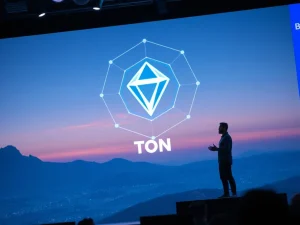Mark Cuban’s Revolutionary AI Productivity: Conquering 700 Emails Daily with Strategic Efficiency

In the fast-paced world of cryptocurrency and high-stakes business, efficiency is paramount. Every minute counts, and for leaders making critical decisions, streamlining communication can be the difference between success and stagnation. Enter Mark Cuban, the billionaire investor and Dallas Mavericks co-owner, who has perfected an extreme yet highly effective system for managing his overwhelming daily communication. He processes an astonishing 700 emails every single day, leveraging cutting-edge AI tools to maintain a near-empty inbox and famously avoiding meetings he deems ‘boring.’ His approach offers a fascinating blueprint for anyone looking to supercharge their own workflow, proving that even in an age of constant connectivity, mastery over your digital inbox is achievable.
Mark Cuban’s Unconventional Approach to Productivity
For most of us, the idea of sifting through 700 emails daily sounds like a nightmare. Yet, for Mark Cuban, it’s a meticulously managed routine that allows him to stay on top of his vast empire. He doesn’t just skim; he processes. His secret lies in a multi-device strategy and a deep-seated aversion to traditional meeting culture, which he views as a drain on time and energy. Instead of coordinating complex group discussions, Cuban prefers the directness and flexibility of email.
- Multi-Device Mastery: Cuban uses three phones – two Androids and one iPhone – to handle messages during every spare moment, whether between workouts, family routines, or other commitments. This constant engagement ensures real-time responses and prevents backlogs.
- Skepticism of Meetings: He openly criticizes traditional meetings for their inefficiency. For Cuban, if it can be handled via email, it should be. This preference stems from a desire for greater control and flexibility in his schedule.
- Decades of Digital Organization: His email habits aren’t new; they date back to the 1980s with CompuServe. This long history has led to a highly systematic approach, using folders and disciplined organization to navigate years of stored correspondence.
The Power of AI Productivity in Inbox Management
While his discipline is impressive, Mark Cuban doesn’t do it all manually. He smartly integrates AI tools to amplify his AI productivity. He’s not just a user; he’s a master of leveraging technology to his advantage. This blend of human discipline and artificial intelligence is what makes his system so robust.
Cuban utilizes Google’s auto-replies and AI-generated responses for a significant portion of his incoming messages – estimated at 10% to 20%. However, he emphasizes that he always adds a personal touch. This isn’t about fully automating his communication; it’s about using AI to triage and draft, allowing him to focus his personal attention where it matters most. By offloading routine responses, AI enables him to maintain a rapid response time and keep interactions engaging, even with a massive volume of emails.
Embracing Asynchronous Communication: A New Paradigm
Cuban’s reliance on email management and his disdain for meetings underscore a broader trend: the shift towards asynchronous communication. In an increasingly remote and globally connected world, real-time meetings can be logistical nightmares, battling time zones, scheduling conflicts, and interruptions. Asynchronous methods, like email, allow individuals to communicate and collaborate on their own schedules, leading to more thoughtful responses and less wasted time.
For Cuban, email’s universality is its biggest strength. “Everyone has it in their back pocket,” he notes, highlighting its accessibility. Its capacity for attaching diverse content – documents, images, links – makes it an unparalleled medium for business dealings, press requests, and internal employee communication. This preference for written, trackable communication reflects a leadership style that prioritizes clear, actionable exchanges over verbal discussions that can often lack concrete outcomes.
Beyond Email Management: Lessons in Work Efficiency
Cuban’s strategy isn’t just about managing emails; it’s a masterclass in overall work efficiency. He isn’t striving for a literal ‘inbox zero’ but rather an ‘inbox near-zero,’ aiming to keep unread messages under 20, often fewer than 10. This requires constant cleanup and a deep aversion to disconnecting. His philosophy is simple: “It’s faster to just get it out of the way.”
His approach offers several key takeaways for modern professionals:
- Prioritization is Key: By quickly processing emails, he maintains a sense of urgency and ownership over his responsibilities, ensuring critical tasks are addressed promptly.
- Structured Discipline: While critics might warn of burnout, Cuban’s disciplined system, combining AI, prioritization, and rigid scheduling, demonstrates that high-volume communication can be managed with structure.
- Challenging Norms: His methodology directly challenges the traditional corporate reliance on meetings, advocating for streamlined, action-oriented communication that channels energy into direct tasks.
Challenges and Considerations for Your Workflow
While Mark Cuban’s system is highly effective for him, it’s important to consider its applicability to different contexts. Not every role or team dynamic can thrive purely on asynchronous communication. Some complex problems genuinely benefit from real-time brainstorming and immediate feedback. The risk of burnout, though mitigated by Cuban’s discipline, remains a concern for those attempting to emulate his volume without his structured approach.
However, the core principles of his strategy – leveraging AI for mundane tasks, prioritizing direct communication, and being intentional about how time is spent – are universally valuable. His habits offer a compelling insight into adapting to evolving digital norms without sacrificing control or productivity. It’s a powerful reminder that rethinking traditional workplace practices can unlock significant efficiency gains.
Mark Cuban’s extreme email management and AI-powered workflow provide a powerful case study in modern productivity. By meticulously processing hundreds of emails daily, strategically employing AI, and deliberately sidestepping unproductive meetings, he demonstrates a radical commitment to efficiency. His methods highlight the growing importance of asynchronous communication and digital mastery in an increasingly digital-first world. While his specific volume might be daunting, the underlying principles of discipline, leveraging technology, and prioritizing actionable communication are invaluable lessons for anyone striving for peak performance in their professional life. It’s a testament to how innovative personal systems can redefine what’s possible in business communication.
Frequently Asked Questions (FAQs)
Q1: How does Mark Cuban manage 700 emails daily?
Mark Cuban manages 700 emails daily through a combination of personal discipline, using multiple mobile devices (two Androids, one iPhone), and leveraging AI tools like Google’s auto-replies and AI-generated responses for 10% to 20% of his messages. He also maintains a highly organized system with folders and prioritizes real-time responses over accumulating unread messages.
Q2: Why does Mark Cuban avoid meetings?
Mark Cuban avoids meetings because he considers them “boring,” inefficient, and time-consuming. He believes that most discussions can be handled more effectively and flexibly through asynchronous communication, primarily email, which allows him greater control over his schedule and ensures direct, actionable exchanges.
Q3: What role does AI play in Mark Cuban’s productivity?
AI plays a crucial role in Mark Cuban’s productivity by helping him triage and draft responses for a significant portion of his emails. While he adds a personal touch to keep interactions engaging, AI tools like Google’s auto-replies help him manage the sheer volume, allowing him to maintain a rapid response time and focus his attention on more critical communications.
Q4: What is asynchronous communication, and why does Cuban prefer it?
Asynchronous communication refers to communication that does not happen in real-time, such as email, instant messaging, or project management tools. Cuban prefers it because it offers greater control, flexibility, and efficiency compared to real-time meetings. It allows him to respond at his convenience, avoid logistical complexities, and ensure that communication is direct and actionable, without the interruptions and inefficiencies often associated with live discussions.
Q5: Can Mark Cuban’s email management strategy be applied to everyone?
While Mark Cuban’s extreme volume and discipline may not be universally applicable, the core principles of his strategy can benefit many. Leveraging AI for routine tasks, prioritizing direct and efficient communication, maintaining a highly organized inbox, and questioning the necessity of every meeting are valuable lessons for enhancing personal and professional productivity across various roles and industries.









